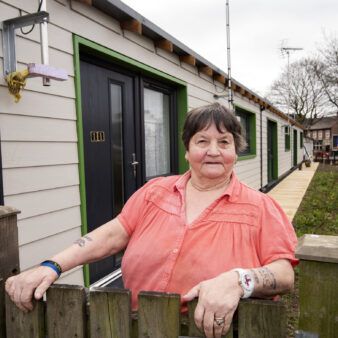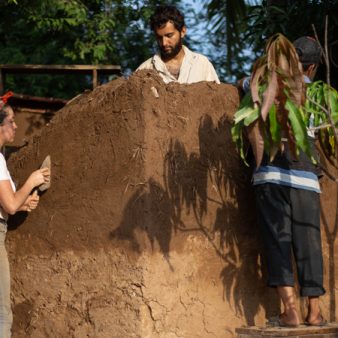Project Description
Aims and Objectives
The main purpose of the Integrated Shelter Delivery Programme is to establish permanent socio-economic urban and rural centres with integrated livelihood projects and basic services operating in a healthy economic and natural environment.
Groups benefiting from the programme include people’s organisations comprised of the urban poor, upland and lowland farming communities and low-income residents of coastal and fishing villages.
The economic activity of the city of San Carlos on Negros Island in the Philippines was severely affected by the worldwide sugar crisis in the 1980s that left thousands of families unemployed and homeless. More than 3,000 vulnerable families were living in inadequate, informal housing conditions on riverbanks and canals or unused plots of land, lacking the most basic services, infrastructure and access to secure land tenure. This situation was further aggravated in 1992 by a great fire that damaged almost 75 per cent of the housing stock in San Carlos City. The Integrated Shelter Delivery Programme (ISDP) was developed by JFLFI to provide an integrated solution to the housing, land, health, livelihood and environmental problems faced by low-income, socially excluded families in the city of San Carlos and surrounding areas.
Developed and carried out by JFLFI in partnership with a wide range of grassroots organisations, the Integrated Shelter Delivery Programme is a comprehensive approach that combines the provision of basic services with a range of other development-related activities such as livelihood programmes, access to secure land tenure through the support of local government units (LGUs), provision of micro-finance and institutional strengthening. The main aspects of the programme include the following:
- Capacity building and community organising, developing solutions through extensive and participatory planning, accompanied by a continuing educational programme.
- Provision of micro-credit for family-based enterprises, housing and land tenure.
- Business development services (BDS) and technology support.
- Programmes for environmental protection, reproductive health and gender awareness.
- Knowledge exchange programmes for young professionals on issues of homelessness and poverty alleviation.
Activities for ensuring access to secure land tenure include the sale of titled lots to the poorest of the urban poor through an affordable purchase scheme. Affordable housing is provided through the use of incremental or multi-stage construction for the provision of basic core houses that are designed to be expanded easily as the family’s ability to afford those increases. Technical assistance and capacity building is provided in the production and use of alternative building materials such as micro-concrete tiles and earth-based technologies. JFLFI works to empower low-income, marginalised individuals and groups and provides institutional support to community-based organisations.
The development of all programme approaches was carried out through a participatory planning process that involved people’s organisations, the local government of San Carlos and national financing institutions. To date, the programme has assisted over 45,000 low-income families and individuals in the city of San Carlos (population 145,000) and the neighbouring municipalities.
Funding of US$4.6 million has been mobilised from a range of sources since 1987 and has been used to support more than 600 development programmes involving 60 people’s organisations, benefiting a total of 45,000 families. These sources include local governments, government housing finance agencies and NGOs specialising in agriculture, forestry, fishing, reproductive health and gender sensitivity. Funds for site development and housing construction are initially covered by JFLFI whilst documentation of house and lot packages are processed and covered by government housing agencies. On-going institutional and project support is provided by MISEREOR-Germany and the Municipality of San Carlos.
Community-based organisations and cooperatives were organised and actively involved throughout the planning and implementation of the various programmes and activities. Multi-family housing programmes involved the establishment of housing associations and residents were active in the conceptualisation of site development and house designs as well as in the final implementation and construction of incremental housing.
The programme, initiated in 1987 has had a significant impact on the quality of life of the residents in terms of increased income levels and livelihood opportunities, improved health and housing conditions, reduced vulnerability and access to secure land tenure. Jerry Rama, member of the HOA people’s organisation in St Joseph Village says that his family now lives in a better environment where they can sleep well without any disturbance, where they own the land and have no fear of ejection, and where the children are not exposed to different types of hazards whether physical, environmental, social or psychological. He states, ‘Now our house is more presentable to my children’s friends – this is important, especially for my son who is already a teenager’.
Why is it innovative?
- Use of community organising and micro-finance as strategies in addressing homelessness and poverty alleviation.
- Integration of other project components in the shelter delivery programme to include secure land tenure, enterprise development, environmental protection, reproductive health and gender sensitivity.
- Strong collaboration with various resource agencies that assist and contribute in the development process.
- Strong integration of community participation in all aspects of project activities, serving as a strategy to ensure programme acceptability among key stakeholders in the area.
What is the environmental impact?
The programme involves the local production of building materials and the use of earth-based technologies. Alternative building materials produced within the programme include micro-concrete roof (MCR) tiles and compressed earth blocks (CEB). These materials and technologies have been developed through close collaboration with the Building Advisory Service and Information Network (BASIN), particularly with the Swiss Centre for Appropriate Technology (SKAT) and the International Centre for Earth Construction (CRATerre).
The appropriate technologies developed by JFLFI and its partners include a range of systems for the efficient use of energy and water resources, such as the Roofing and Rain Harvesting System (RRHS) for housing construction and drip irrigation in farming to conserve water resources. Recently, the compressed interlocking block (CIB) technology is now being integrated into the JFLFI’s earth-based construction initiatives.
The programme also involves coastal management activities, including the conservation of mangrove areas.
Is it financially sustainable?
The programme does not rely on one source of funding but rather receives financial support from a range of sources, including international donor agencies, NGOs and local and national government agencies. Despite changes in political structures and the economy, the programme has been running successfully for nearly 20 years.
The programme involves a range of income generation activities, including the provision of micro-credit and technical support for the development of growth-oriented enterprises for both urban and rural communities.
These include:
- Cultivation of high value crops.
- Fishing and coastal resource enterprises.
- The production of alternative construction materials and housing construction using earth-based construction materials.
The extensive use and production of the compressed earth block (CEB) technology has led to the formation of a workers’ association that now has 320 active members engaged in housing construction and the production of building materials.
Through the local government of San Carlos City, land is offered to families living in informal settlements on manageable terms. No down payment is required and no interest applied. Incremental housing units have been provided for 1,800 households, allowing families to expand and improve their homes as and when they can afford to do so. Micro-credit has been made available for housing and the creation of small enterprises.
What is the social impact?
JFLFI works closely with people’s organisations and local community groups. Active participation of residents throughout the process has facilitated community integration.
A wide range of capacity-building programmes have been carried out, including the provision of training in the production of the compressed earth block technology and other alternative building materials. Business development services have also been provided, including marketing support for products from cooperatives, community associations and family-based enterprises.
The provision of safe housing and basic services has greatly reduced the vulnerability of low-income families involved in the programme. Secure land tenure has been provided to 10,800 individuals to date.
Income generation activities and increased livelihood opportunities, as well as the gender focus of the programme, have led to a reduction in economic, social and gender inequalities.
The programme works to organise and provide institutional support to people’s organisations. Community members and groups are actively involved in decision-making processes as well as in the implementation of elements of the programme.
Barriers
There was a lack of acceptance of earth as a construction material amongst building professionals and government authorities. Extensive community application of compressed earth blocks was carried out to demonstrate the feasibility of the use of earth-based technologies that are aesthetically attractive. It was also shown that the use of earth-based technologies results in lower building costs.
The lack of local government resources for land banking, a capital-intensive and expensive form of ensuring land tenure security for the poorest of the poor, presented itself as a barrier to ensuring the success of the programme. To overcome this problem, JFLFI carried out sustained advocacy among local government units. A number of local government organisations in Negros Island have since invested resources for land allocation in housing the poor.
Lessons Learned
- Develop a programme not a project activity. Develop a methodology that encourages integration.
- Pilot initiatives can provide a “good bench marking” – but one size does not fit all. Some will work in a humongous scale and some will not.
- Providing an integrated package of services is more effective than a single independent project. Shelter delivery is better implemented when integrated with other development-related programmes.
- Sustained development efforts require local government authorities that are more effective, more accountable and more equipped and capable to work with informal and marginalised groups and their community organisations.
- Local problems should be addressed with local solutions. The poor cannot wait for sluggish centralised government action. A collaborative solution should be developed amongst civil society, local government, the private sector and urban poor groups to create integrated and sustainable local solutions.
Evaluation
A continuous monitoring and evaluation process has been carried out throughout the project’s development and implementation. The organisation observes a quarterly monitoring schedule and annually conducts an in-house year-end programme evaluation to chart and position the direction of the programme’s future priorities.
Transfer
The programme has grown from its beginnings in 1987 to now cover over 45,000 families. It is planned to expand the programme to other communities in San Carlos as well as to neighbouring towns, following the principle of integration of various activities as the key to poverty reduction in both urban and rural communities. The JFLFI Young Professionals Programme hopes to raise awareness amongst young professionals across the country on issues related to homelessness and poverty alleviation.
Local government units have adopted a training programme for integrated municipal shelter delivery, in partnership with various academic communities in the Philippines.
The programme has also influenced policy at local level, through the establishment of a city ordinance that mandates local government units to allocate funds for social housing and land banking to ensure secure land tenure. JFLFI has played a major role in the formulation of the San Carlos City Master Development Plan, which is currently being implemented.
Knowledge exchange activities have taken place at national level amongst agencies involved in development in urban areas. JFLFI’s experience and other development initiatives relating to community participatory planning, alternative construction materials, sanitation, incremental housing and micro-finance are being shared in youth camps, forums and training activities.
JFLFI works in close collaboration with members of the Building Advisory Service and Information Network (BASIN) in the development of appropriate technologies and environmentally sustainable building materials. Within the international network, the organisation plays a major role in disseminating appropriate technology covering the Asian region.
Partnership
Donors, CBOs, Local Community


